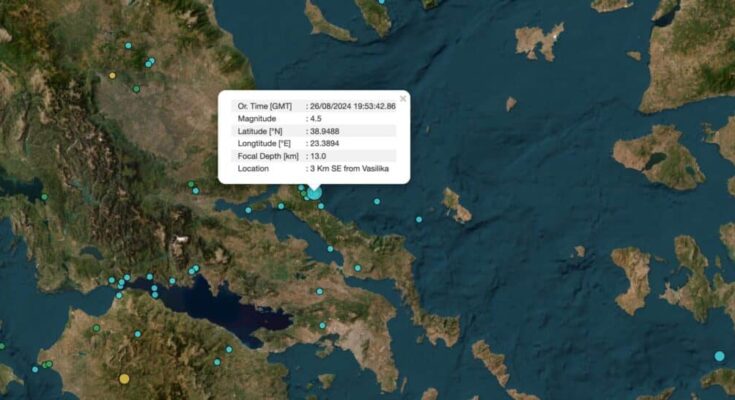
A strong earthquake that rattled North Evia shook several areas of Attica on Monday night. According to the Geodynamic Institute of the National Observatory of Athens, the Attica earthquake had a magnitude of 4.5 on the Richter scale.
It struck at 10:53 PM local time, with its epicenter located in Evia, specifically 4 kilometers southeast of Vasiliki Istiaia. The earthquake’s focal depth was 15.4 kilometers.
Aftershocks follow Evia, Greece earthquake: recent seismic activity
Minutes after the main tremor, two minor aftershocks hit the same region. The aftershocks had low intensity. However, they are crucial for understanding the ongoing earthquake details that seismologists are analyzing closely. The first aftershock occurred 22 minutes after the main quake, at 11:15 PM. It registered 1.4 on the Richter scale and had a depth of 5 kilometers. Its epicenter was also 8 kilometers east-southeast of Vasiliki Istiaia. The second aftershock happened just two minutes later, measuring 1.7 on the Richter scale. Experts are observing these aftershocks to evaluate any further impact related to the earthquake.
Northern Evia has experienced a total of seven earthquakes in the last 48 hours. Except for the 4.5 magnitude quake, all the other tremors were below 2 on the Richter scale. This frequent, low-intensity seismic activity contributes to the broader context of Attica earthquake details that have raised concerns among experts.
Seismology professor Gerasimos Papadopoulos urged the public to remain calm after the earthquake. He said, “The earthquake with a magnitude of 4.5, centered 4 kilometers from Vasiliki in northern Evia, was also felt in Attica. We advise everyone to stay calm and composed. We will provide more Attica earthquake details tomorrow as we gather additional information.”
Expert reactions and public advice after Evia, Greece earthquake
Efthymis Lekkas, a professor of Dynamic Tectonics and Natural Disaster Management at the University of Athens tried to provide reassurance. He described the 4.5 magnitude quake as typical for the region’s seismic activity. He noted that the epicenter was in the Psaropouli area and added, “This earthquake fits the normal seismic activity for the region. The area generally experiences moderate seismicity.” He also said, “We don’t have information yet on significant effects in northern Evia, but the quake was felt widely across central Greece, including Attica.” Lekkas concluded, “We are actively analyzing the data and monitoring the situation closely.”
For his part, the director of the Geodynamic Institute, Akis Tselentis, emphasizes that the phenomenon is being monitored. He also clarifies that this area has ordinary seismicity and recently experienced a sequence of lower-intensity tremors. In his opinion, although it is still early, there is no particular cause for concern.



